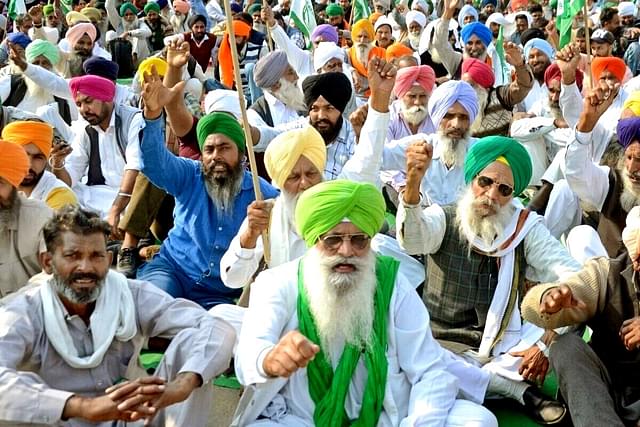Talks Fail, Farmers Push Delhi March: City Gears Up for Traffic Hell, farmer protests
Increased security measures put in place for a march of farmers from Punjab, Haryana, and Uttar Pradesh to the Capital were expected to cause traffic chaos in the National Capital Region on Tuesday even as the Delhi Police have enforced prohibitory orders restricting movement and public gatherings.
 |
| Image Credit - Swarajya |
farmer protests - The bustling city of Delhi braces itself for a day of chaos and protests as farmers from Punjab, Haryana, and Uttar Pradesh plan to march to the Capital. With heightened security arrangements in place, the city prepares for potential traffic havoc and disruptions.
The Delhi Police have implemented prohibitory orders to restrict movement and public gatherings, anticipating the arrival of the protesting farmers.
Amidst rows of metal barricades, shipping containers, concertina wires, and trenches placed on Delhi's fringes, tensions rise as the farmers converge on the Capital's Singhu, Tikri, and Ghazipur border points.
Traffic Nightmare Expected
As the farmers make their way towards Delhi, traffic chaos is expected to ensue. The jams are likely to spill over onto arterial stretches throughout the city, causing disruptions in its outer, eastern, central, northern, and southern parts.
To mitigate the impact on commuters, the Delhi Police have issued revised traffic advisories, warning of potential diversions at Singhu, Ghazipur, and Tikri borders depending on the prevailing conditions.
Commercial vehicles have already faced restrictions since February 12, while all types of vehicles will be affected from February 13 onwards.
Unprecedented Security Measures
To ensure public safety and maintain law and order, over 50 Delhi Police and paramilitary companies have been strategically deployed at the Singhu, Tikri, and Ghazipur borders.
These security personnel are equipped with tear gas launchers and shells, bulletproof vests, helmets, batons, and sophisticated weapons. Drones have also been deployed to monitor the fringes of the city.
Multi-layered blockades, consisting of iron barricades, jersey barriers, shipping containers, barbed wire fencing, and iron nails, have been put in place to prevent the protesting farmers from entering Delhi.
In addition, an alert has been sounded in all police stations across the city. Police personnel have been directed to intensify police pickets, patrolling, and vehicle checks.
Check-posts have been set up in central Delhi at locations such as the Ranjit Singh flyover, Mandi House, ITO, Minto Bridge, Mathura Road, and Ring Road.
Stalemate in Talks
The heightened security measures stem from an impasse in talks between Union ministers and farmer leaders. The recent meeting between the two sides ended without resolution, with farmer leaders accusing the government of merely trying to buy time.
The heads of the protesting farmer bodies held discussions with Union ministers, including Piyush Goyal and Arjun Munda, but failed to reach a mutually agreeable solution. The government offered to create a committee to address the farmers' demands, but the farmers remained unsatisfied.
Farmers' Demands
The protesting farmers are demanding minimum support prices for their crops, waivers on farm loans, and job opportunities for the relatives of those who lost their lives during the 13-month-long farmers' protest. They are also seeking compensation for the farmers injured in Lakhimpur Kheri and the withdrawal of cases against protesting farmers.
The protests intensified after four farmers were tragically mowed down in Lakhimpur Kheri, with Union minister Ajay Kumar Mishra Teni's son being a key accused in the incident.
Past Protests and Repeal of Agriculture Laws
Last year, farmers held one of the largest demonstrations in decades, forcing the government to repeal three controversial agricultural reform laws that were enacted in September 2020.
Tens of thousands of farmers camped on highways across multiple states for nearly 14 months, setting up protest townships at sites like Ghazipur, Singhu, and Tikri.
These protests disrupted traffic and challenged the government's claim that the reform laws would benefit the farmers by granting them access to broader markets. On the contrary, farm unions argued that these laws would leave cultivators at the mercy of large corporations.
Pre-emptive Measures Taken
Security forces have taken pre-emptive measures to prevent a recurrence of the massive protests witnessed last year. Elaborate security arrangements have been made at key borders to Delhi.
The experience gained from the previous farmers' agitation has helped authorities in devising robust security strategies to maintain peace and order.
Despite the government's assurance of remaining open to further talks, tensions remain high as the farmers gear up for their march towards the Capital.
As Delhi stands on alert, battle-ready to manage the influx of protesting farmers, heightened security measures and traffic disruptions mark the onset of what could be another significant chapter in the ongoing farmer protests.
The fate of the negotiations and the demands of these farmers hang in the balance as they attempt to make their voices heard in a city caught in the crossfire of heightened tensions.



Post a Comment